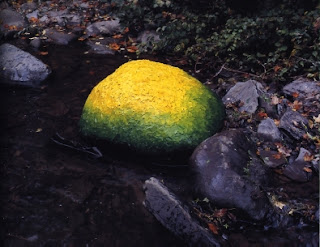Continued from
part three.
Now let's look at a few more green, sensible and meaningful ways to get rid of those energy reserves. I'm offering a long list here, not because I think you should do them all, but to make sure that there are at least a few suggestions in there for everyone. It's by no means comprehensive, so feel free to add any ideas you have in the comments below.
- If you have one, walk your dog more often. He/she will love you for it. (Don't try this with cats. It simply doesn't work.)
- If you have kids, play active games with them: tag, ball games, limbo dancing, lifting them in the air and pretending they're aeroplanes, and whatever you can think of that requires muscle activity. If you don't have kids, borrow your sister's, brother's, neighbour's, ...
 |
| (c) T.M.O.F. - cc |
- Instead of dumping it in the dryer, hang your laundry outside. Consider this valid exercise. As a bonus: you'll have to take it back in afterwards. Double exercise points!
- When
unloading groceries: don't pile up shopping bags or boxes to carry them inside in one go. Instead: walk a few times back and forth. Much better for your back, and every extra step counts. (Although I have to admit: piling them up and balancing isn't bad either, as it counts as weight training)
- Try to combine walking or working out with grocery shopping. Instead of driving your car to the supermarket and then going for a walk, jog or workout afterwards, consider walking or jogging to the baker's or the neighbourhood store.
- Bring a
packed lunch to work
, take it to a nearby park or public garden, go for a walk, and have lunch
al fresco.
- W
ash your car by hand (with a spunge and a bucket of water and just a little bit of soap) instead of driving to the carwash. There's no need for lots of hose action if you apply "the force", i.e. muscle power. If you have kids or a playful spouse or friend, get them involved.
 |
| (c) Daniel McCullum - cc |
- Two words: snowball fight. In the absence of snow, water balloons will do.
-
Use the commercial breaks during your favourite television programmes to get up, stretch a bit, do a silly dance to one of your favourite songs, or get a couple of minutes of house work done.
- Wiggle your toes any chance you get. Don't forget to enjoy it.
-
Make love as often as you can. Sex is a great way to get your heart pumping and your whole body moving. (If you're under the legal age in your country, or a sex addict: please ignore this advice. Silly dances are fun too)
- Instead of going out to eat, with a partner or with friends, prepare a picnic basket, go for a walk and
have a fun or romantic picnic in a beautiful setting.
- When you take the
bus or tram to work:
get off a couple of stops before or after your regular one. That way you have a short walk that helps you to be fully awake for work, or that can refresh your buzzing mind afterwards. It's also a great way to see more of your surroundings, to meet people in a different environment or to get inspired for other activities: you might see posters for a concert, an art exhibition or a museum you haven't been to. Also: vary! On a bright sunny day, be brave and go for more stops; if it's cold, go for a brisker walk.
 |
| (c) Manjith Kainickara - cc |
-
Grow a garden. Don't let it die. If you have a piece of land, however small it is: cultivate your own fruit, veggies & herbs, and take care of them. If you don't have the space, be creative: get pots for your balcony or window sill, look for allotments or communal garden projects in your area, or talk to an elderly neighbour with a plot of land. They might love to get some help or let you use it, in return for a small share of the harvest. Herbs especially are great, because they're easy to grow, and they really spice up your meals with their gorgeous scents and vibrant shades of green, yellow, red, purple, ....
- Have a
housecleaning competition with your partner, roommate or children. Assign each competitor a room, or part of a room, and the first one to get their side spotless, wins the prize! This is by far my least favourite tip, regardless of the prize.
-
Get to know the area or city where you live. Challenge yourself by hanging up a map, putting pins where you've already been, and give yourself a week, a month, ... to fill up the empty spaces.
-
Volunteer in a soup kitchen, animal shelter, community building or after-school project. Most of the work includes physical activity and it's a great way to give back the energy you've been storing.
- Mind your posture. It's not just better for you physically (it takes more muscle effort so you'll burn more calories), it also helps to boost your confidence and makes you feel better about yourself.
 |
| (c) Jean-Pierre Dalbera - cc |
-
Dance. At parties, weddings, in clubs or on your own.
Take dance classes. There are so many genres to choose from: bellydancing, African, hip-hop, flamenco, salsa, swing, jazz, Bollywood, Indian temple dancing, tap dance, ballroom, capoeira, disco, medieval, you name it. There's a style for everyone!
- Visit interesting places. Travel, explore and discover parts of your country, continent, planet, galaxy, that you haven't been to before. Few things are more inspiring than being in a new environment.
-
Play an instrument. Any one will do, but the heavier the better. Percussion comes highly recommended.
-
Organise birthday parties for your kids, family or friends. Look for fun and creative themes and make the decorations, toys and games yourself, on your own or with friends, family or other parents.

-
Walk around when you're on the phone (works significantly better with mobile phones)
- Move your scanner, printer, ... further away from your desk so you have to get up every time you need to use it. Don't get annoyed about it. Consider it exercise and praise yourself.
- When you drive to work,
park your car further away. Even if it's just on the other side of the carpark, or a couple of blocks away, every extra step counts.
-
Take the stairs whenever you can. If you start off in a really bad shape, take the elevator to 1 or 2 floors below where you have to be, and walk the rest.
-
Take massage classes with a friend or partner. Practice often on the people around you. Be sure to get their permission first.
-
Stretch, swing and shake! Whatever you're doing, whether it's cooking, reading, typing or slouching. Stretch in all directions, swing your arms and legs, wiggle your shoulders and shake that bootie.
These are just ideas. I hope you've found a few you like, and most importantly: I hope they've inspired you to come up with your own, which - by the way - I would love to hear.
♥ Bookmark or share this post ♥





































